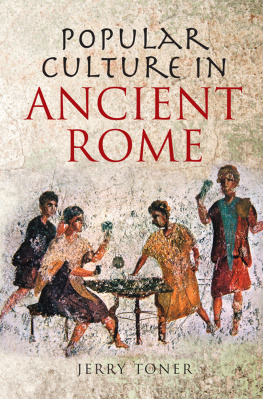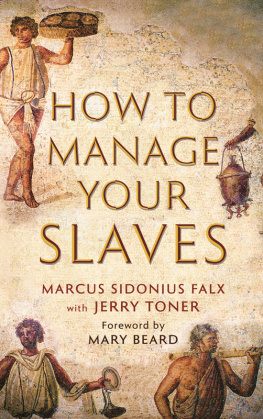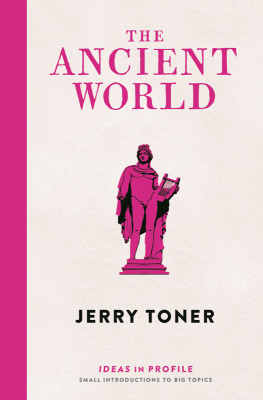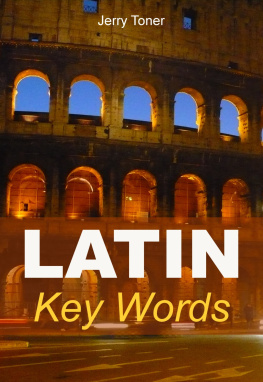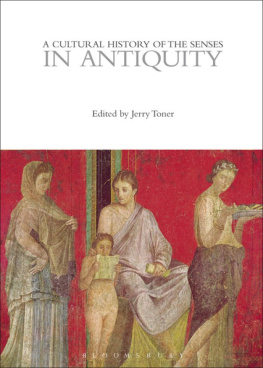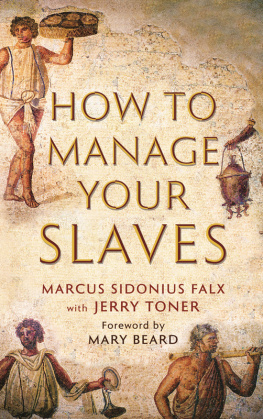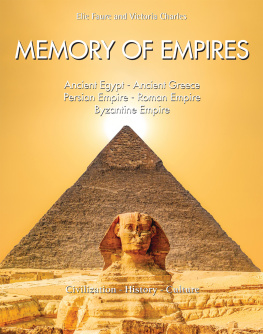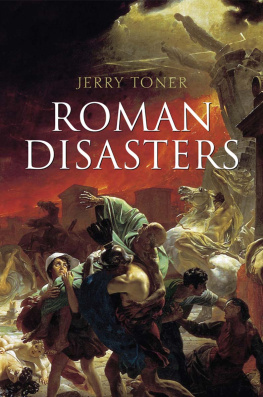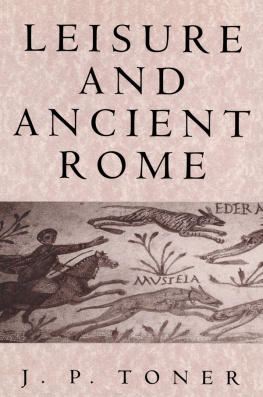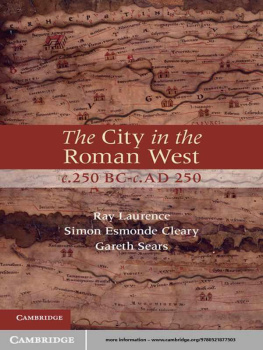By the same authors
How to Manage Your Slaves
Release Your Inner Roman
CHAPTER I
A GRAND TOUR

T HE EMPEROR HAD SUMMONED ME . Guards directed me to a broad terrace on the spur of the Palatine hill where he was walking in an agitated manner, followed by a gaggle of advisers. He is very tall and extremely pale, with an unshapely, hairy body. He also has a very thin neck and legs, and hollow eyes that sink below a broad forehead, above which his thinning hair sticks out in wisps. He is touchy about his baldness and it is forbidden to look down on him from any higher place. His face is naturally threatening but he works hard to make it all the more so by practising savage expressions in front of a mirror.
Ah Falx! he greeted me, Here is a man who will give me a straight answer. Tell me, Falx, what would you do to improve the empire?
O emperor, what a question is this, I began, and, wishing to assure him of the impossibility of the task, added, as the proverb says, you are asking me to milk a he-goat!
The emperor stopped as if he had been hit by a bolt from Jupiter. His entourage stared at me in horror at what I had said. How was I to know that the emperors touchiness about his straggly hair and knock-kneed physique extended to a ban of any mention of goats! A lesser man would have faced execution.
Get away from here, he snarled with his most terrifying glare, and keep away well away.
I scuttled out of the palace. Unnerved, I have faced the barbarian hordes in battle, but I do not mind admitting that fear now made me sweat like the Tiber in full flow. I had offended the emperor and had been told to make myself scarce. It was time to lie low for a while.
I decided it was best for me to leave Rome and to do so quickly. I would travel first thing down to my villa at Baiae. But the emperor himself is known to enjoy holidaying at that seaside resort so I could hardly stay there for long. I considered my properties in north Africa, the large estates I had inherited from my uncle in Gaul, the olive farms in Hispania I had bought many years ago to import oil into Rome. All were suitably far away. And then there was so much of our great empire that I had never seen. I had studied in Athens as a young man but had not returned since. I had experienced the chaos of Alexandria for some weeks when sent on official business but had not had time to make the leisurely journey up the Nile to see the wonders of the pharaohs. And then there was my son, Titus, who was commanding forces up on the wall in the farthest-flung corner of icy Britannia. What better opportunity to surprise him and deliver in person those socks he is always asking my wife to send.
I realised that it was my chance to tour the empire. But a guidebook to help such a task was sorely lacking. I had read various travels guides to parts of Greece but they were mostly written by Greeks who were determined to try to revive the glories of their ancient past. With their endless tales of the Greeks victories against the Persians, their detailed accounts of their local myths and customs, it is as if their present-day subservience to Rome does not exist. I decided that I would take this opportunity to write a guidebook for all the most memorable places and monuments throughout the whole empire, to be written in ten books. No one, not even a Greek, has ever attempted a grand tour of the entire Roman empire.
There is a great need for such a guide. Almost the whole world seems to be travelling back and forth across the empire. Why? Men travel for a whole range of reasons. Some go in search of education and spend years in Greece at the feet of philosophers. Many senators, as my father did, send their sons to Athens to hone the skills of oratory that will be so important to their careers in public life. What educated man is less than fluent in Greek, which he must master in order to adorn his speeches with a liberal scattering of apt quotes of the great bard, Homer? Others go looking for health. How many have made the long trek to Pergamum to consult the healing god Asclepius in his lavish sanctuary there. Aided by the attendants, they sleep in the temple precincts so that the god himself might visit in a dream and tell them what course of treatment to pursue. Or they go to consult with the great practitioners of Greek medicine, who can diagnose the humoral imbalances responsible for their illnesses.
Many travel for trade. Wherever you go, you see cargoes coming from as far off as southern Arabia and even India, in such numbers that their lands must have been stripped bare of spices. Nearer to home, the farmlands of Egypt and north Africa transport their rich harvests in the huge grain ships that are the lifeblood of the city of Rome. It is a wonder that there is space in the sea for so many ships.
Naturally, it is the common classes who travel for money. Those who can afford a life of leisure often make tours to explore the many interests that the empire has to offer. Human nature is such that we are curious about other peoples and places, and are keen to travel. Many make sea voyages, and endure long solitary journeys alone, simply to see some remote sight. For nature, self-conscious of her own beauty, made us natural admirers of her attractions. So people are eager to see with their own eyes anything special they have read or heard about. Of course, with some, this urge to travel becomes almost a sickness. Because they dont know what they want, are too fond of soft living, and yearn perpetually after something meaningful, which otherwise eludes them, they indulge in a pointless roaming across the earths surface. Natural marvels, places where miracles have occurred, zoological curiosities, bizarre customs of far-off people all are pursued with a desperate thirst for experience that no amount of such travel seems to slake.
These idle rich wander aimlessly, travel along distant shores, sometimes by sea, other times on land, always trying to calm some inner restlessness. Lets go to Campania! they will say. But they will soon grow bored and long for wild places and head off for Lucania or the like. But, once there, they will pine for beauty and sophistication and rush down to Tarentum to enjoy its pleasant climate. And no sooner have they arrived than they will miss the noise and bustle of Rome and be overcome with a desire to see some bloodshed at the Colosseum. So one journey succeeds another, and one sight is changed for another. They seem to be fleeing from themselves.
It is the Roman empire that has made all of this travel possible. The immense majesty of the Roman peace and its excellent network of communications by both road and sea has generated an ease and security of travel that only serves to increase this wanderlust. We Romans have mapped out the world, bridged rivers, cut roads through mountains, and have filled wastelands with posting stations where officials can find an inn to stay and a stable to provide fresh horses. Yet hardly any of those non-Romans who wish to know about touring the jewels of the empire have any idea where to start. This guide will tell them all they need to know.
What glories shall we see? To begin with there is the architecture. Were all other knowledge of the Roman world to be lost, so many huge ruins would survive that it would be clear what a mighty civilisation had built them. The arches, bath houses, cupolas, bridges and aqueducts all tell of a prosperity that no previous age ever came close to matching and I cannot imagine that any human society will ever surpass. The so-called Seven Wonders of the World date from the time when Alexander had recently conquered the Persian empire, and reflect the narrow outlook of the Greeks: Alexandria, Rhodes, Olympia, Halicarnassus, Ephesus, Memphis and Babylon. But Roman prosperity and building skill have seen the continuous growth and embellishment of cities across the empire. There are now some 250 cities in Tarraconese Hispania alone. Even those founded by the Greeks, such as Alexandria, have blossomed under Roman rule. And everywhere, all these cities are captivated by one aim: to outdo their rivals and neighbours and to appear the loveliest of all. Even in those formerly barbarian regions of the north, there are triumphal arches, paved piazzas, marble temples and stone amphitheatres. They gleam in splendour and the whole world seems to have turned to pleasure and magnificence.
Next page

